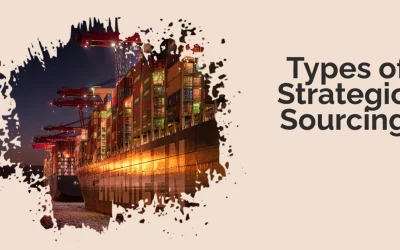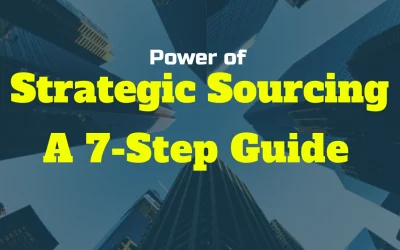Strategic sourcing is a vital aspect of supply chain management that involves identifying and managing the best procurement solutions for a company’s needs while mitigating supply risks and saving money. This process enables companies to optimize expenses and improve their EBITDA, which ultimately leads to a higher return on shareholder value. It is no wonder that CXOs should care about strategic sourcing as it is a crucial step in ensuring business success and profitability.
In today’s competitive business environment, there is a growing need for companies to optimize their procurement processes to remain competitive. Strategic sourcing is one of the most effective ways to achieve this goal. By adopting a strategic sourcing approach, companies can identify and evaluate suppliers, negotiate contracts, and manage their supply chains more efficiently. As a result, they can improve their bottom line, reduce costs, and enhance their competitive position in the market.
In this article, we will explore the key concepts of strategic sourcing and the eight-step methodology for successful implementation, highlighting why CXOs should care about this process and the benefits it can bring to their organizations.
Key Takeaways
- Strategic Sourcing can optimize expenses and improve EBITDA and return on shareholder value, making it a crucial consideration for CXOs.
- Longer contracts with fewer suppliers can create primary supplier relationships, leading to stronger, more trusting, and mutually beneficial relationships.
- The 8 Step Strategic Sourcing Methodology includes identifying the category, analyzing the category, developing the sourcing strategy, identifying potential suppliers, evaluating suppliers, negotiating with suppliers, implementing the solution, and managing the supplier relationship.
- Proactively reviewing requirements, consolidating volumes over longer periods, and creating longer contracts with fewer suppliers can dramatically improve pricing and create stronger supplier relationships.
What is Strategic Sourcing?
Strategic Sourcing, as previously defined, refers to the proactive identification and management of sourcing solutions that mitigate supply risk, save costs, and ensure the best outcome for a company or consumer.
It involves a comprehensive approach to procurement, which includes forecasting requirements, analyzing historical purchases, researching the market to determine sources or suppliers to satisfy those requirements, and developing a sourcing strategy on how to acquire the goods or services.
The benefits of Strategic Sourcing are numerous. It can optimize expenses, improve EBITDA, and return on shareholder value.
Longer contracts with fewer suppliers can create primary supplier relationships, which can create stronger, more trusting, and mutually beneficial relationships. However, implementing Strategic Sourcing poses some challenges.
Proactively reviewing requirements, consolidating volumes over longer periods, and creating longer contracts with fewer suppliers can dramatically improve pricing and create stronger supplier relationships. On the other hand, short circuiting the Strategic Sourcing process or buying tactically can waste company money.
Thus, companies must invest in the right people, processes, and technology to ensure the effective implementation of Strategic Sourcing.
Key Concepts
The concept of Category Management involves proactively managing a group of similar goods or services, which can lead to significant cost savings and streamlined supplier relationships. By grouping similar goods or services, businesses can take steps to standardize their procurement process, identify opportunities for consolidation, negotiate better prices, and improve quality control.
Category Management can also lead to better supplier relationships, as companies work more closely with fewer suppliers, and develop more strategic, long-term partnerships. This can help mitigate risk, decrease the time required for supplier onboarding, and improve communication and collaboration between the business and its suppliers.
Longer contracts with fewer suppliers can create primary supplier relationships, which can lead to stronger, more trusting, and mutually beneficial relationships. By working closely with a smaller number of suppliers, companies can improve supplier performance, reduce costs, and increase efficiency. Furthermore, longer-term contracts can encourage suppliers to invest in the relationship, and work to meet the customer’s evolving needs.
This can lead to greater innovation, better quality, and a more reliable supply chain overall, which can ultimately help businesses improve their bottom line. In summary, Category Management and long-term contracts are important concepts within Strategic Sourcing, as they can help businesses optimize expenses, improve ROI, and build stronger supplier relationships.
8 Step Methodology
One key aspect of the 8 Step Strategic Sourcing Methodology is identifying the category, which involves analyzing data to determine the company’s requirements and researching the market to find potential sources or suppliers that can meet those needs. This step is critical because it helps the company to identify its options and to make informed decisions. Additionally, analyzing historical purchases can help the company to identify patterns and trends that can inform future decisions.
Supplier evaluation is another important step in Strategic Sourcing. It involves evaluating potential suppliers based on various criteria such as cost, quality, delivery time, and reliability. This step is crucial because it helps the company to select the best supplier that can meet its requirements and deliver value. Evaluating suppliers can also help to identify potential risks and to mitigate them before they become problems.
By following the 8 Step Strategic Sourcing Methodology, companies can optimize expenses, mitigate supply risk, and improve ROI.





0 Comments